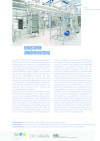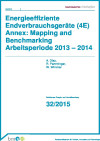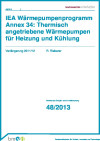Suchergebnisse
IEA EBC Annex 68 Webinar: Küchendunstabzüge in Kombination mit Wohnraumlüftung (2021)

Dieser Vortrag präsentiert ausgewählte Erkenntnisse bzw. Beiträge aus diesem IEA Projekt zum Thema raumluftqualitätsoptimierte Planung und Betriebsführung von energieeffizienten Wohngebäuden.
Herausgeber: bauinformation.com
Deutsch
IEA AMF Task 63 Online Seminar-Serie: Sustainable Aviation Fuels
17. November und 1. Dezember 2022
Online
Drei Online Seminare werden im Rahmen des AMF Projekts zu nachhaltigen Flugtreibstoffen durchgeführt (IEA AMF Task 63: Sustainable Aviation Fuels). Diese dienen dazu, Best Practice Beispiele vor den Vorhang zu holen und zu diskutieren. Die Vortragssprache ist Englisch.
IEA EBC Annex 61 Subtask D Report: Deep Energy Retrofit Guide for Decision Makers (2017)

Der Bericht stellt eine Zusammenfassung der Ergebnisse und Erkenntnisse aus den einzelnen Subtasks dar.
Alexander Zhivov, Lohse Rüdiger
Herausgeber: New Buildings Institute (NBI)
Englisch, 76 Seiten
Downloads zur Publikation
IEA EBC Annex 83: Qualitative Assessment Methodology for Positive Energy District Planning Guidelines (2022)

Dieses Konferenzpapier präsentiert eine Analyse des aktuellen Stands der Technik bei Richtlinien zur Planung und Umsetzung von Positive Energy Districts (PED), basierend auf der Analyse von 25 PED-Richtlinien.
Hans-Martin Neumann; Sergio Díaz Garayo; Niki Gaitani; Daniele Vettorato; Laura Aelenei; Judith Borsboom; Ghazal Etminan; Anna Kozlowska; Francesco Reda; Jørgen Rose; Pekka Tuominen
Herausgeber: IEA EBC Annex 83
Englisch
IEA AFC Annex 31: A Brief Review of Poly(Vinyl Alcohol)-Based Anion Exchange Membranes for Alkaline Fuel Cells (2022)

Diese Übersicht enthält aktuelle Studien über Poly(Vinylalkohol)-basierte Membranen als alternative Anionenaustauschmembranen für alkalische Brennstoffzellen. Die Entwicklung von Anionenaustauschmembranen im Allgemeinen, einschließlich der Arten, Materialien und Herstellung in den letzten Jahren, wird diskutiert.
Asep Muhamad Samsudin, Merit Bodner und Viktor Hacker
Herausgeber: MDPI, Polymers 14, 17, 2022
Englisch, 26 Seiten
IEA HPT Annex 56: Digitalization and IoT for Heat Pumps Task 3: Data analysis (2023)

Der Bericht fasst Informationen zur Datenaufbereitung, Datenmodellen, Metadaten und BIM zusammen und strukturiert und diskutiert verschiedene Methoden zur Datenanalyse anhand von 16 Beispielen.
Herausgeber: IEA Heat Pump Centre
Englisch, 41 Seiten
Downloads zur Publikation
IEA-ISGAN Annex 6 Workshop Summary: "Power Transmission and Distribution Interaction - a challenging MMORPG (Massively Multiplayer Online Role-Playing Game)

Um dem Thema aktive Verteilnetze und der Interaktion dieser mit dem Übertragungsnetz innerhalb von Annex 6 mehr Bedeutung zu schenken, wurde im Rahmen der Smart Grid Week am 13. Mai 2013 in Salzburg ein öffentlicher IEA-ISGAN Annex 6 Workshop abgehalten. Die Ergebnisse des Workshops sind in diesem Bericht zusammengefasst.
Artikel in der Zeitschrift "nachhaltige technologien" Ausgabe 2017-3: Industrielle Abwärmenutzung

Im Artikel wird das Projekt Annex 15 zur Optimierung und Weiterentwicklung von energie- und kosteneffizienten Technologien für die Nutzung industrieller Abwärme dargestellt.
Herausgeber: AEE - Dachverband
Deutsch, 1 Seiten
Downloads zur Publikation
5th Expert Meeting of IEA ES Task 39 - Large Thermal Energy Storages for District Heating
15. - 16. September 2022
Hjulmagervej 55 - 9000 Aalborg - Denmark, Aalborg, DK
The content of the two-day event includes expert discussions, workshops and project presentations on large-scale thermal energy storage systems.
IEA HPT Annex 50: Country Report Austria - Task 2.2: Acoustic characteristics of MFH air-to-water heat pumps with description of measures to reduce noise emissions (2021)

Der Task 2.2 Country Report zeigt die Besonderheiten, die bei der akustischen Betrachtung von Wärmepumpen in Mehrfamilienhäusern zu beachten sind.
Ch. Reichl, A. Zottl
Herausgeber: AIT Austrian Institute of Technology, 2021
Englisch, 70 Seiten
Downloads zur Publikation
PEDs - Positive Energy Districts: Essentielle Komponenten für eine "Net Zero" City
2. Februar 2023, 13:00-15:00
Digital, AT
Dieser digitale Stakeholder-Workshop geht der Frage nach, welche Beiträge das internationale Netzwerk zu Positive Energy Districts (IEA EBC Annex 83) zum Ziel "Net Zero by 2050" leisten kann und wie diese Aktivitäten mit österreichischen Initiativen vernetzt werden können.
IEA HPT Annex 49: Simulation-based Methodology For Comparison Of nZEB Requirements In Different Countries Including Results Of Model Calibration Tests (2019)

Auf der Basis der State-of-the-Art-Analyse in Annex 49 wird derzeit eine Methodik zur Bewertung und zum Vergleich des Anspruchsniveaus in den teilnehmenden Ländern entwickelt.
Ochs, Fabian; Dermentzis, Georgios; Monteleone, William
Herausgeber: IEA HPT, 2019
Englisch, 8 Seiten
Downloads zur Publikation
VERSCHOBEN: Webinar - Datengetriebene Betriebsoptimierung und Effizienzcharakterisierung von Gebäuden
31. März 2022 verschoben
Online
Das ursprünglich für 31. März geplante Webinar kann leider nicht mehr als solches auf der Plattform bauinformation.com durchgeführt werden. Die Vorträge werden im Rahmen einer Session in der e-nova 2021 Konferenz am 2. Juni 2022, in Pinkafeld gehalten.
IEA DHC Annex TS3 - Workshop "Hybride Energienetze, Fernwärme im integrierten Energiesystem"
20. Oktober 2022
Online, AT
Hybride Energienetze, also die Integration von Strom-, Wärme- und Gasnetzen, können entscheidend zur Optimierung des Energiesystems beitragen. Der IEA DHC Annex TS3 hat das Ziel Potentiale und Herausforderungen hybrider Energienetze aus Sicht des Fernwärme/Kälte-Systems zu analysieren. Im Workshop werden Technologien und Synergien, die Bewertung von Tools und Methoden, die Analyse von Fallbeispielen sowie die Entwicklung geeigneter Geschäftsmodelle und Rahmenbedingungen vorgestellt, analysiert und diskutiert.
15. International Summer School on Advanced Studies of Polymer Electrolyte Fuell Cells and Hydrogen
28. August - 2. September 2023
TU Graz, AT
This summer school offers students and early career researchers intensive days of lectures, workshops, networking and socialising. The event covers a broad spectrum of fuel cell and hydrogen research by internationally renowned experts in the field of polymer electrolyte fuel cells and additional lectures on various hydrogen technologies.
Energieeffiziente Endverbrauchsgeräte (4E) Annex: Mapping and Benchmarking Arbeitsperiode 2013 - 2014

Schriftenreihe
32/2015
A. Díaz, R. Pamminger, W. Wimmer
Herausgeber: BMVIT
Deutsch, 58 Seiten
Downloads zur Publikation
IEA Wärmepumpenprogramm Annex 34: Thermisch angetriebene Wärmepumpen für Heizung und Kühlung

Verlängerung 2011/12
Schriftenreihe
48/2013
R. Rieberer
Herausgeber: BMVIT
Deutsch, 128 Seiten
Downloads zur Publikation
IEA EBC Annex 58: Report of Subtask 3, part 1: Thermal performance characterization based on full scale testing – description of the common exercises and physical guidelines

Dieser Bericht dokumentiert verschiedene Fallstudien, wo mit Hilfe dynamischer Datenanalyse Testobjekte unterschiedlicher Komplexität charakterisiert wurden und leitet Hilfestellungen für den Versuchsaufbau ab.
María José Jiménez (ed.)
Herausgeber: KU Leuven
Englisch, 176 Seiten
Downloads zur Publikation
IEA HPT Annex 49: Facade-integrated Decentralized Cooling System - Evaluation in an Outdoor Test Facility (2018)

Das Ziel dieser Arbeit ist die Bewertung eines fassadenintegrierten dezentralen Kühlsystems in einer Freiluft-Testanlage.
Brandl, D., Heinz, A., Mach, T., Schmiedbauer, O., Zimmerberger, S., Rennhofer, M., Schlager, T. & Selke, T.
Herausgeber: IEA HPT, 2018
Englisch, 17 Seiten
Downloads zur Publikation
Potential for cost reduction and performance improvement for PEMFC at component and system level
10. - 11. November 2021
Graz University of Technology (online and on-site), AT
Internationally recognised experts will provide insights into the latest developments and forecasts for cost reduction and performance improvement of advanced polymer electrolyte fuel cells (PEFC or PEMFC). The presentations will cover the entire fuel cell value chain and include interdisciplinary considerations from the component to the system level.
